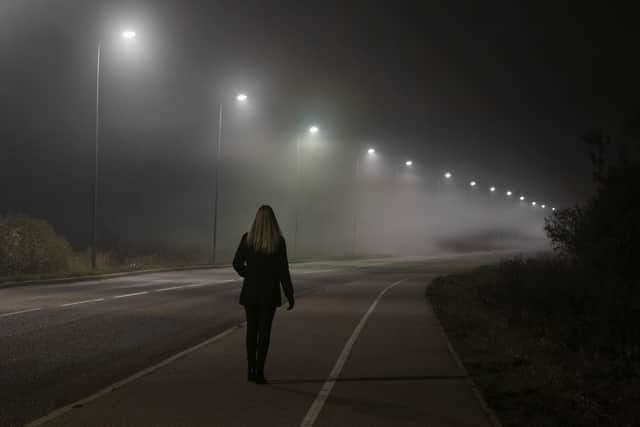Take women’s safety seriously, not only when it’s too late
and live on Freeview channel 276
In early September - less than six months after Sarah Everard’s murder and only a few weeks before Wayne Couzens’ sentencing and the murder of Sabina Nessa - I found myself walking home alone after a bidding war between me and a drunk man resulted in me losing a pre-booked private hire and him getting chauffeured to Bearsden for £50.
While in an ideal world a woman’s safety should have taken prominence over an increased financial incentive, I understand the different reasons the taxi driver may have thought otherwise. Maybe the driver never heard about Sarah Everard. Maybe he really needed the extra fare, or maybe he just did not care.
Advertisement
Hide AdAdvertisement
Hide AdNow, it would be too simplistic to use my scenario as a direct comparison to what society is like or to assume, had it all happened at a different time, the outcome would have been different. However, the reason why I am even mentioning this event is that the whole way home - walking late at night, feeling unsafe and angry about the situation, I could not help but think about Sarah Everard and ask: How could we – myself included – push aside the anger, frustration, and calls to action we all felt back in March?


Six months ago, Sarah Everard, the need for change and what we could do to make it happen, had been all me and my friends talked about. In September, I could not remember exactly the last time I said Sarah Everard’s name.
To say I had forgotten about what it is like to be a woman in our society is wrong – myself and other women hardly get the chance to forget the increased danger of assault, unfair treatment, casual sexism, or gender-based stereotypes we face every day. What I had pushed to the back of my mind was the collective calls to action I previously felt and talked about so strongly. In March I had shouted “system change” to then revert to the old ways less than six months later.
Not only does this feel morally wrong but recent events have shown that letting women’s safety take the backseat in discussions leads to the re-emergence of victim blaming and unpolished solutions that address the symptoms but not the root cause of gender-based violence.
Advertisement
Hide AdAdvertisement
Hide AdFirst it was North Yorkshire police’s Philip Allott’s comments criticising Sarah Everard for submitting to Couzens’ arrest and asking all women to be “streetwise” about legal processes that showed how entrenched victim blaming still is. More recently it was the new 888 service, dubbed the “Walk Me Home” app, that came under fire.


Many women cannot feel the same level of excitement as the app’s creators or Home Secretary Priti Patel, who endorsed the app, have felt. These “solutions” feel like nothing but confirmation that women’s safety is not an issue that is taken seriously by governing bodies - despite the worrying evidence spanning back decades.
In the UK, 1,425 women were killed by men between 2009-2019 according to the The Femicide Census report, and in early October it was revealed that around 80 women were killed since the Sarah Everard killing - one of them Sabina Nessa. And femicide is only the tip of the iceberg of sexual violence against women.
In Scotland, four out of every five reported incidents of domestic abuse had a female victim and a male accused according to figures by Zero Tolerance, and earlier this year, a ScotPulse survey discovered as many as three in five Scottish women are survivors of sexual harassment or assault.
Advertisement
Hide AdAdvertisement
Hide AdViolence against women is a consequence of gender inequality in society. We already have handbag alarms and location tracking devices; but they are not what keeps us safe. What we need is a system that does not treat male violence against women as inevitable. This starts at the grassroots level in the form of preventative measures based on education and conversation about respect, gender equality, and consent.


We live in a society where gender-stereotypes are enforced from an early age, rape culture and harmful behaviours are normalised, and survivors are blamed for their abusers actions by authoritative bodies. It is time we dismantle this culture by talking about women’s rights all year round - not just when it’s too late.
This is what charities and expert organisations have been saying and trying to change for years. Yet, many of us only talk about women’s safety after it is too late, leaving too much time between for misogyny and gender inequality to return.
In a piece for The Scotsman, Sandy Brindley, Chief Executive of Rape Crisis Scotland, said: “Though it is difficult to grapple with, we live in a culture that trivialises and condones rape and sexual violence. A culture is something that is created and it’s something that we have the power to change.”
Advertisement
Hide AdAdvertisement
Hide AdThis November marks the 30th anniversary of the global 16 Days of Activism against gender-based violence campaign. This year’s initiative will have a special focus on femicide and extending the campaign “from 16 to 365 days of activism”.
Like many other awareness days, the campaign should not be needed in the first place nor should it be celebrating a three-decade anniversary.
Organisations have been urging us all to do our part to end gender-based violence for a long time. It is time we heed their calls.
Daniella Theis is editor-in-chief of the University of Strathclyde’s Telegraph. She was named Student Journalist of the Year at the Scottish Press Awards 2021
Help and Support:
Rape Crisis Scotland: https://www.rapecrisisscotland.org.uk/help/
The Rosey Project: https://www.roseyproject.co.uk
Women’s Aid: https://www.womensaid.org.uk
A message from the editor:
Thank you for reading this article. We're more reliant on your support than ever as the shift in consumer habits brought about by Coronavirus impacts our advertisers.
If you haven't already, please consider supporting our trusted, fact-checked journalism by taking out a digital subscription.
Comment Guidelines
National World encourages reader discussion on our stories. User feedback, insights and back-and-forth exchanges add a rich layer of context to reporting. Please review our Community Guidelines before commenting.